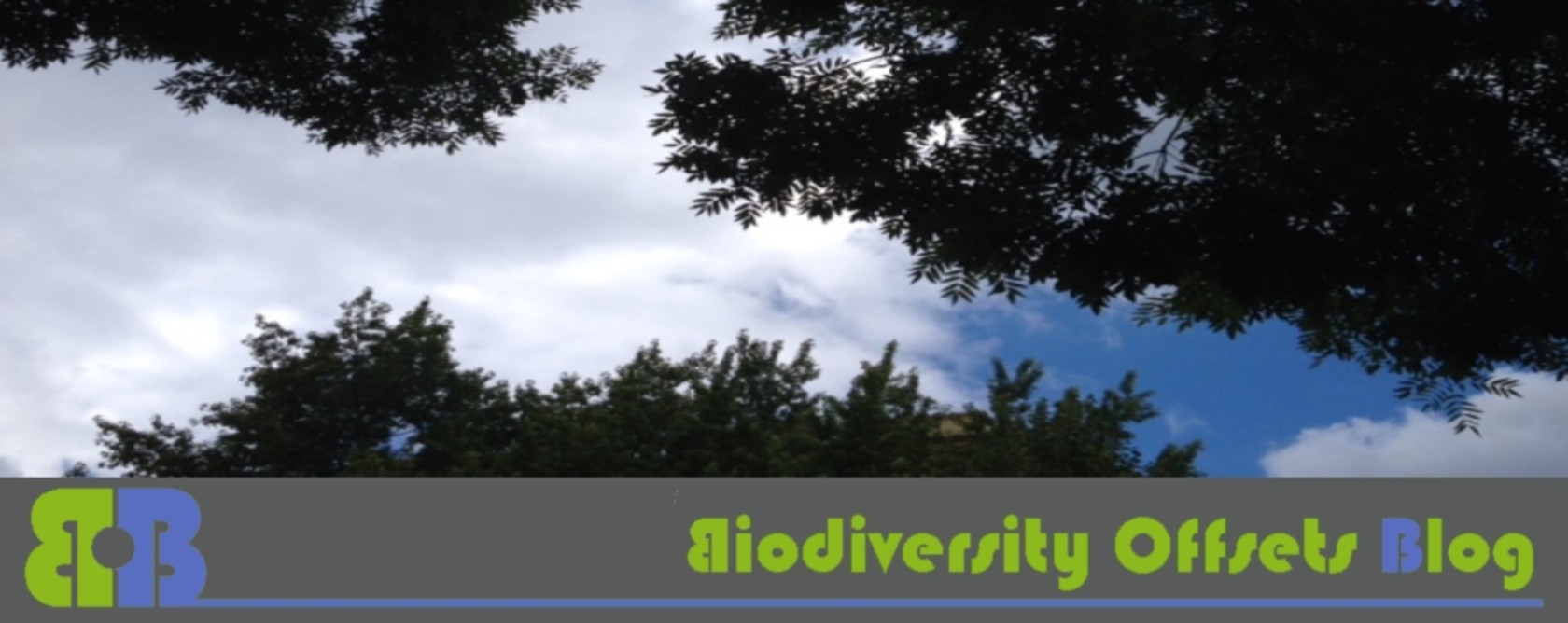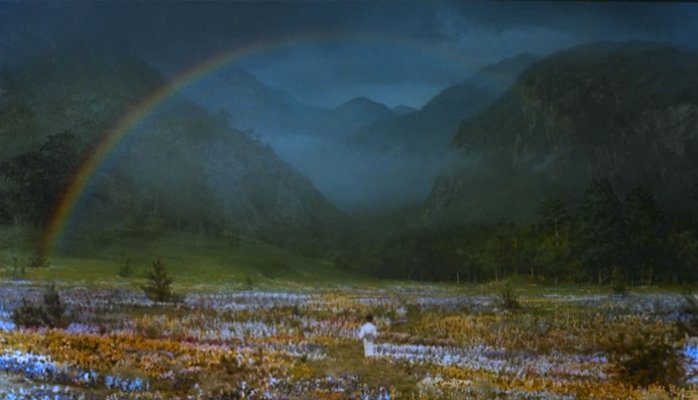This is the sixth and final part of a guest post series by Nuno Gaspar de Oliveira who works as consultant and advisor in Esporão, a portuguese main wine and olive oil company, in the area of Strategic Management for sustainability using ‘Business Ecosystems’ models,
This guest post has previously been published on LinkedIn. It is the expression of the author’s thoughts and experiences and as such is acknowledged as a fruitful contribution to the discussion on biodiversity offsets. If you want to react or clarify your own position (underpin or disprove), please leave a reply below!
So, Nature finally had a price tag. Or at least a value considering its natural capital, as provided by the Earths’ biomes and ecosystems.
At the same time that Costanza’s audacity to “put a number on nature” was gaining momentum, another increasingly appealing concept was on a fast track to succeed both at the political and media level – the Ecological Footprint. The idea of Ecological Footprint was developed since the early 90’s by scientists like William Rees and Mathis Wackernagel and mainly leveraged on the concept of carrying capacity and the biosphere’s ability to regenerate resources and provide services. In a short definition:
“Ecological footprint can be represented as the aggregate area of land and water in various ecological categories that is claimed by participants in that economy to produce all the resources they consume, and to absorb all their wastes they generate on a continuous basis, using current technology. (…) Ecological economists acknowledge that industrialized societies depend for survival not only on labor and human-made capital, but also on natural capital” (Wackernagel and Rees, 1996).
The Ecological Footprint model, on which the human impacts could be measured in a normalised version on how much land it would take to produce a given service/product — the Global Hectare vs Earth’s Biocapacty – focused mostly in a commoditized view of nature’s services and resources. Yet, natural capital cannot be simplified into resource accounting and inventory, something that’s has been made clearly stated by economists like John Richard Hicks and Herman Daly. Hicks and inclusively proposed an early version of natural capital full accounting called the ‘Hicksian Natural Income’, that could be shortly defined as “the level of consumption that can be sustained from one period to another period without reducing natural wealth”. Daly reinforced the importance of adequately introduce the concept of natural capital accounting into the mainstream economy, pointing out one of the major problems ahead:
“Our problem is that the capital we have endeavored to maintain intact is humanly created capital only. The category ‘natural capital’ is left out. Indeed it is left out by definition as long as one defines capital as produced means of production” (Daly, 1994)
Following this line of though, combining early outcomes from ecological economists and ecologists working with economic models for estimating nature’s carrying capacity and ecosystem services, some people came to the conclusion that full accountability and integration of natural capital was something absolutely critical for business strategy development.
Among these people, a trio composed by Amory B. Lovins, L. Hunter Lovins and Paul Hawken embraced the concept of natural capital and enabled it into a postmodern vision of capitalism in their book ‘A Road Map to Natural Capitalism’ (1999). Strongly based on the beliefs that rationalism and ecologism could bind together to form a new vision of sustainable business strategy, the authors argued that ‘no one would run a business without accounting for its capital outlays’. It was made clear that most companies overlook one major capital component — the value of the biosphere. And this idea produced a new and defying approach to a future ecological-economic governance system:
“Natural capitalism addresses those problems by reintegrating ecological with economic goals. Because it is both necessary and profitable, it will subsume traditional industrialism within a new economy and a new paradigm of production, just as industrialism previously subsumed agrarianism. The companies that first make the changes we have described will have a competitive edge. Those that don’t make that effort won’t be a problem because ultimately they won’t be around.”
Yes, a new governance system was an increasingly pursued ‘holy grail’both for politicians, economists and an increasing fringe coming from the scientific community.
One of this ‘new crusaders’ was Elinor Ostrom, a senior economist deeply curious of Hardin’s allegations on the ‘Tragedy of the Commons’ theory and subsequent developments on the same. Ostrom’s strong convictions on the human ability to use ‘common sense’ led her to argue that, as a whole, we would sort out rational ways of surviving and getting along. Despite the world’s arable land, forests, fresh water and fisheries were all finite, it was possible to share them without depleting them and to care for them without fighting. Yes, just because she studied (the) tragedy, it didn’t meant that she fully agreed with its outcome:
“Unfortunately, many analysts – in academia, special-interest groups, governments, and the press – still presume that common-pool problems are all dilemmas in which the participants themselves cannot avoid producing suboptimal results, and in some cases disastrous results.”‘Governing the Commons’ (1990)
Almost 20 years after her game-changing arguments on governance models for the commons, on which most natural capital value was included both as commodities and externalities, in her 2009 Nobel Memorial Prize speech, Ostrom argued on how common property could be successfully managed by user associations, making the atmosphere an asset with property rights on behalf of the global community. Anyone who damages the global property is charged for damage, which provides legal justification for instruments like a carbon tax, which tax is used to pay a dividend to all of the owners. And from then onward, the need for a juridical framework that embedded natural capital global governance had been consistently chased.
And the chase continues, with economics and business strategy being one of the most active fronts. Most companies are taking a huge risk by treating natural resources as if they are infinite rather than measuring and responding to the business risks created by their dependency on natural capital. This dependency is still largely hidden from view, meaning that companies could have significant unmanaged risks in their supply chains and material off-balance liabilities.
The significance is straightforward enough: companies make money from natural capital in one way or another – it includes the raw materials to make products, the ocean on which those products are sailed to new markets and the fuel the ships burn – but they rarely account for the true costs or the associated risks. This will leave them vulnerable as it becomes more obvious that, contrary to traditional economic and financial thinking, natural resources are not infinite.
One of the champions defending the urgent need to fully and comprehensively account for natural capital is nothing less than HRH Charles, Prince of Wales, the patron of ‘The Prince’s Accounting for Sustainability Project’. In one of the project’s initiatives, ‘The Prince’s Accounting for Sustainability Forum’ (2013), Prince Charles stated that:
‘In stark financial terms, all the evidence demonstrates a simple fact: we are failing to run the global bank that we call our planet in a competent manner. We no longer just take a dividend each year; instead, for some time, we have been digging deep into our capital reserves. And, after the near collapse of our entire financial system, we all know that such excessive risk-taking can cause immense havoc. The ultimate bank on which we all depend – the bank of natural capital – is in the red; the debt is getting ever bigger and that is reducing Nature’s resilience and considerably impeding her ability to re-stock. It leaves us dangerously exposed.’
Albeit Ostrom’s hope that we could agree on a happy ending based on rationality and humanist perspectives, we still fail to approach even the thinner layers of common ground to ‘domesticate’ the economic and financial system that makes money spin around. We became more and more found of risking everything, despite the fact that we know so little about the risks we’re taking.
In 2005, out of the mist of trade pits came a philosopher, announcing that we were being ‘Fooled by Randomness’. In 2007 the same person warned us about the impacts of the highly improbable, the now called ‘Black Swan’ effect. Nicholas Nassim Taleb appeared like he himself was a black swan, shocking our naïve convictions that all could be explained and predicted by illuminated people in high places (and seated in higher money piles). In fact, we were not just being irrational but strongly prone to follow dangerous persons and beliefs:
“It has been more profitable for us to bind together in the wrong direction than to be alone in the right one. Those who have followed the assertive idiot rather than the introspective wise person have passed us some of their genes. This is apparent from a social pathology: psychopaths rally followers” ‘The Black Swan: The Impact of the Highly Improbable’ (2007)
Taleb’s allegations went further up on the road when in 2012 he released a ground-breaking hypothesis stressing the importance of dispersing risk and also, at the same time, consider inaction when unsure on how to interfere with a given phenomenon and also assume limited or controlled risk taking decisions.
Beyond resilience, there was Antifragility. The ‘Antifragility hypothesis’states that a positive response to a stressor or source of harm (for some range of variation), leading to a positive sensitivity to increase in volatility or variability, stress, dispersion of outcomes, or uncertainty to some point, some systems might even benefit from a certain degree of stress and disturbance in order to create mechanisms and options to deal with shocks and major disturbances. In short, Antifragility could be better understood when looking deeply into the way Mother Nature’s takes care of us and of her natural systems:
“If there is something in nature you don’t understand, odds are it makes sense in a deeper way that is beyond your understanding. So there is alogic to natural things that is much superior to our own. Just as there is a dichotomy in law: ‘innocent until proven guilty’ as opposed to ‘guilty until proven innocent’, let me express my rule as follows: what Mother Nature does is rigorous until proven otherwise; what humans and science do is flawed until proven otherwise”, ‘Antifragile: Things That Gain from Disorder’ (2012)
And so, with this perspective that we are in no case superior to Nature in what regards providing and maintaining a global equilibrium, vital to human existence, and mostly based on what we often call ecosystem services and natural capital availability, we’re coming to the end of our very short ‘short story’ on how natural capital has been perceived by mainly the western society.
I’m aware of the limits of this narrative and my own limits on fully understanding it, or about the things that I’ve approached in this series of articles. But in order to close this ‘Brief Historical Perspective on Natural Capital’ series, I’d like to leave you with a final though, not from a western economist or ecologist, but from an oriental non-scientist, one of the most sentient artists of the XXth century:
“People today have forgotten they’re really just a part of nature. Yet, they destroy the nature on which our lives depend. They always think they can make something better. Especially scientists. They may be smart, but most don’t understand the heart of nature. They only invent things that, in the end, make people unhappy. Yet they’re so proud of their inventions. What’s worse, most people are, too. They view them as if they were miracles. They worship them. They don’t know it, but they’re losing nature. They don’t see that they’re going to perish. The most important things for human beings are clean air and clean water.” Akira Kurosawa in ‘Yume (Dreams)’, 1990.

